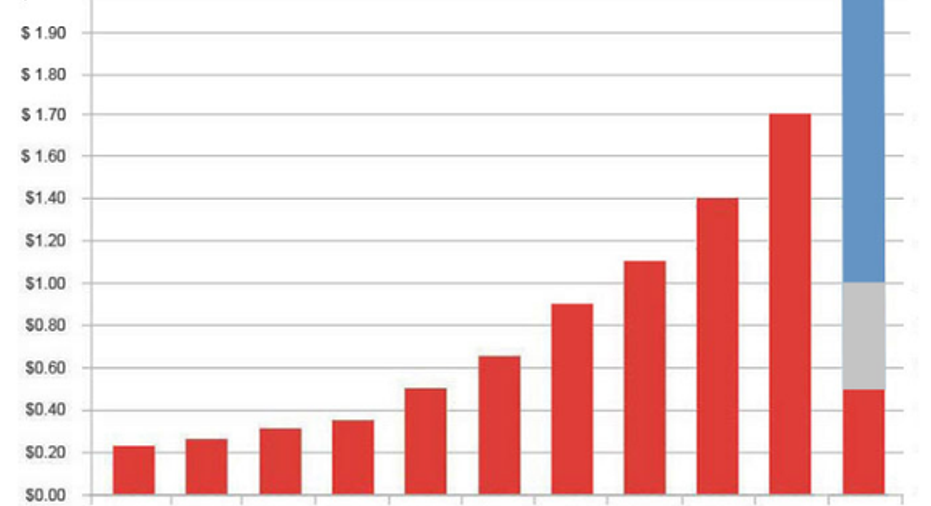5 Stocks With Ridiculously Fast-Growing Dividends

Hockey legend Wayne Gretzky's statement about skating "to where the puck is going to be, not where it has been" has become something of a cliche. But it's still a good strategy for hockey -- and for investing.
The way to determine where a puck is going to be requires evaluating its direction and speed. I used a similar approach to identify five stocks with fast-growing dividends: Boeing (NYSE: BA), Amgen (NASDAQ: AMGN), CVS Health (NYSE: CVS), Texas Instruments (NASDAQ: TXN), and AbbVie (NYSE: ABBV). Here's why these stocks could be great picks for dividend-seeking investors.
Image source: Getty Images.
Boeing: Flying higher
Boeing's dividend has increased by an average annual rate of more than 31% over the last three years. The giant aircraft manufacturer now boasts a dividend yield of 3.2%. If Boeing continues growing its dividend at the current pace, the company's dividend will nearly double by 2020.
Can Boeing's dividend keep flying higher? Probably so. The company currently uses roughly 57% of its earnings to fund dividend payments. Boeing should be on track to continue improving its bottom line over the next five years as it has done in recent years.
The company stands to be a prime beneficiary if the Trump administration succeeds in advancing its plans to beef up the military. Boeing recently won a U.S. Navy contract for 12 fighter jets. More military orders could be in store. That's good news for shareholders hoping for even higher dividend payments.
Amgen: Granddaddy of biotechs dishing out dividends
Amgen has been in business for almost 40 years, making it something of a granddaddy among biotech stocks. The company's dividend track record may be short (Amgen initiated its dividend in 2011), but it's certainly sweet. Over the past three years, Amgen has hiked its dividend by an average of nearly 30% annually.
The big biotech's dividend yield currently stands at 2.7%. Amgen should have no trouble keeping the checks flowing. It spends only 39% of earnings to cover dividend payments.
Although Amgen faces competition for Epogen, Neulasta, and Neupogen, several of the company's other products are continuing to grow at solid rates. Amgen also should receive a boost from its pipeline, which features 12 late-stage clinical programs.
CVS Health: A pharmacy that pays you
Over the past three years, pharmacy services leader CVS Health has increased its dividend by an average annual rate of 27% and now sports a dividend yield of 2.5%. CVS Health's longer track record of dividend growth is impressive also, as the chart below shows.
Image source: CVS Health.
Expect more dividend increases in the future. CVS uses less than 35% of its earnings to fund the dividend program. The company's CFO has publicly stated that CVS Health is committed to further annual dividend hikes.
CVS Health stumbled somewhat in 2016, losing a couple of big contracts to rival Walgreens Boots Alliance. However, the company still anticipates average annual earnings growth of 10% or more well into the future.
Texas Instruments: Chipping in the cash
Texas Instruments (TI) began paying a dividend in 1962. The technology company has kept the dividends flowing ever since. Over the past three years, TI increased its dividend by an average of 22% annually. Its current dividend yield stands at 2.4%.
There doesn't appear to be any danger of Texas Instruments breaking its dividend streak anytime soon. The company uses roughly 47% of its earnings to pay out dividends, which leaves plenty of room for future growth.
Texas Instruments enjoys a manufacturing cost advantage over many semiconductor chip competitors that allows the company to generate tremendous free cash flow. This makes the stock a great long-term pick for investors seeking solid dividends.
AbbVie: A biotech with an impeccable dividend pedigree
AbbVie's dividend yield of 3.9% ranks as the highest of the companies mentioned. The biotech has raised its dividend by an average annual rate of more than 17% over the last three years. And although, AbbVie has officially only paid out a dividend since 2013, its history extends much longer than that. The company's parent, Abbott Laboratories, has increased its dividend for 45 years in a row.
Can AbbVie keep on boosting its dividend in the future? It seems quite likely. The biotech currently uses around 63% of its earnings to fund its dividend program. However, AbbVie's earnings picture should improve significantly.
Top-selling autoimmune disease drug Humira continues to rake in money. AbbVie claims two impressive cancer drugs in its lineup with Imbruvica and Venclexta. Even better, the company has several pipeline candidates that could be huge winners down the road, including cancer drug Rova-T and anti-inflammatory drug risankizumab.
10 stocks we like better thanWal-MartWhen investing geniuses David and TomGardner have a stock tip, it can pay to listen. After all, the newsletter theyhave run for over a decade, the Motley Fool Stock Advisor, has tripled the market.*
David and Tomjust revealed what they believe are theten best stocksfor investors to buy right now... and Wal-Mart wasn't one of them! That's right -- theythink these 10 stocks are even better buys.
Click hereto learn about these picks!
*StockAdvisor returns as of March 6, 2017The author(s) may have a position in any stocks mentioned.
Keith Speights owns shares of AbbVie. The Motley Fool recommends CVS Health. The Motley Fool has a disclosure policy.



















